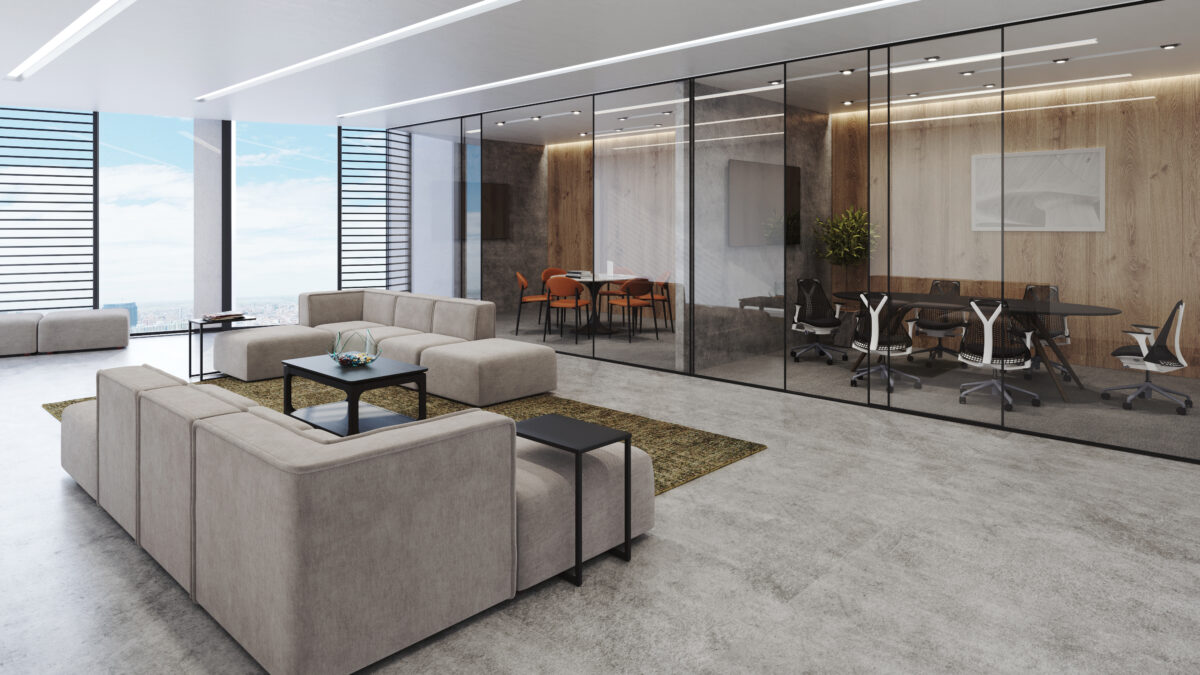Looking Ahead
The dawn of a new year is always exciting, with fresh new ideas and ideals on the horizon. As 2024 quickly approaches, CORT is looking toward the emerging trends shaping tomorrow’s workplace.
The office has been evolving at a rapid pace since the onset of the pandemic. Many of the trends we saw in 2023 will likely continue, with several new ones emerging as well. For employers, remaining attuned to the changes is essential to fostering a positive environment that can help attract and retain talent with future-forward adaptations. Some of what we expect to see in the year ahead include an ongoing demand for flexibility and inclusivity, growing adoption of technology, and a new generation influencing the workplace.
What are some of the trends to watch for in 2024? Let’s take a closer look.
The Imperative of Flexibility
Flexibility has been in demand for the past few years, and it will remain a trending topic for the year ahead. Workable’s 2023 report, “The Great Discontent 2.0” revealed that 66.7% of workers viewed personal-professional balance as a benefit of workplace flexibility, up from 55.8% in 2021. This data underscores just how deeply this trend is affecting the workforce.
In 2024, flexibility is likely to expand beyond desk workers. While organizations will continue offering hybrid and flexible schedules to meet the needs of employees and remain competitive, industries that require workers’ physical presence will also begin offering flexible options. That may include an uptick in part-time schedules, which leaves the door open for employees to pursue personal passions and side work.
CORT Is Built on Flexibility
CORT Workplace’s offerings have always been designed to offer flexibility, which is more important in 2024 than ever. Furniture-as-a-Service gives companies the ability to seamlessly scale their furniture as needed, replace and update items with ease, and better meet the evolving needs of their employees. CORT’s adaptable furniture solutions also cater to these evolving needs, creating an inclusive, supportive workplace with ergonomic chairs, adjustable desks, and communal spaces boasting thoughtful design with comfort and employee well-being in mind.
In increasingly popular hybrid models, employees may split their time between working from home and the office. Continuing on 2023’s trend of adding homey touches, the 2024 office space must accommodate the shifts in occupancy and usage while adding the appeal necessary to attract employees back to the office and provide a seamless transition between different work modes and team configurations.
Coffee Badging ― A New Kind of Workplace Presence
As the return to work struggle continues into 2024, a new twist on an old trend is emerging. Coffee badging is a new term not entirely dissimilar from the “clock in, clock out” outlook in years past. However, coffee badging describes employees who make an appearance at the office for short periods before leaving to work in environments they feel are more conducive to their needs.
It’s a response to the push for more in-office activity and rigid return-to-office mandates, which have created an overwhelming need for more flexibility and autonomy. Much like Quiet Quitting, coffee badging is a nearly silent form of protest against the traditional work models that employees no longer value. To cope with this trend, employers must approach their workforce with open communication, flexibility, and a shift in what the organization prioritizes. Valuing outcomes over employees’ presence can make a tremendous difference and help everyone keep goals and expectations top-of-mind.
How CORT Can Help Combat Coffee Badging
Designing a workplace that provides options for employees to work in various settings and the types of environments that work best for their work styles can go a long way to entice them to want to remain in the office for more than just making an obligatory appearance. CORT Workplace can help enable organizations to do just that.
Imagine transforming your traditional office spaces into more adaptable and responsive environments that provide areas for quiet, focused work and other spaces for brainstorming and collaboration. For example, modular furniture and movable workstations can be reconfigured to support a variety of work settings, from team projects to individual work areas. This flexibility in the physical environment mirrors the flexibility employees are seeking in their work arrangements and sends a message that the organization values and supports different work styles and personal needs.
CORT Workplace’s solutions can help create spaces that feel more inviting and less institutional. By incorporating elements that reflect the comfort and familiarity of home, these spaces can make the time employees spend in the office more enjoyable and productive, which in turn, can counter the coffee-badging trend.
The DEI Conversation Shift
In 2024, businesses can expect to see their employees looking for concrete, decisive action. Over the past few years, employees have noticed a decrease in support and sustained DEI efforts, and now the focus is shifting. The focus on diversity, equity, and inclusion (DEI) is shifting. Companies should lead with inclusion, weaving it into their culture to create a sustainable, natural inclination toward DEI that stands up to the rigors of everyday work life. The Supreme Court’s 2023 affirmative action ruling already has some companies defining or redefining their DEI programs to focus on all three elements in such a way that it becomes less about the hype and more about meeting people’s needs.
CORT Workplace Amplifies the DEI Conversation
There’s more to diversity, equity, and inclusion than revamped hiring practices. With CORT Workplace, companies can design inclusive, adaptable spaces that meet diverse needs, ensuring that every employee feels valued and supported.
How can this be accomplished? A comprehensive approach to DEI includes offering a variety of workspace options that accommodate different working styles and needs. Start by talking to employees and assessing those needs. This may include providing quiet areas for focused work, lounge-like collaborative spaces that encourage team interaction, and ergonomic furniture that caters to varying physical requirements. CORT can help organizations provide flexible, adaptable workspaces, breaking down barriers and fostering a sense of belonging among all employees.
Gen Z’s Growing Influence
Generation Z, the demographic born from 1997 through 2012, will account for approximately 23% of the workforce worldwide by 2024. Like each generation before it, Gen Z is bringing characteristics and values unique to them to the workplace. It makes up approximately 27% of the world’s population and is known as one of the most ethnically diverse, technologically savvy, open-minded generations.
Growing up in a world shaped by significant global events like the September 11 attacks and the 2008 Great Recession has influenced Gen Z to seek stability. Additionally, it is the first digital native generation, the very first demographic raised with the technologies we use today. This shaped Gen Z’s approach to combining the physical and digital world and impacts how they view the workplace. Additionally, Gen Z seeks meaningful, flexible, and inclusive work environments that allow them to achieve a healthy work-life balance and align with their social and environmental values.
How CORT Can Help Companies Meet Gen Z’s Expectations
Gen Z wants improved mental health awareness, organizational commitment to DEI and environmental and social responsibility-minded initiatives, and opportunities for professional growth. It’s also a generation that values personalization and employers that can pivot and adapt to meet their individual needs and working styles.
Companies offering customizable work environments will likely gain favor with what many refer to as “Zoomers.” CORT supports those efforts with a range of furniture options that allow employees to tailor their workspaces in a way that best suits their working style and preferences. For example, the use of modular furniture such as sit-stand desks, and tables and chairs with wheels make it easy for workers to easily move throughout the office and rearrange for group collaboration.
The Trends of 2024
Is your business prepared for the year ahead and all that it brings? Now that you have a better idea of the trends to keep an eye on, including flexibility, inclusivity, technological integration, and a new generational influence, how will your company adapt? Creating a forward-thinking environment can go a long way toward making a positive impact on the workforce.
CORT Workplace, Furniture as a Service, is positioned to help businesses navigate these concepts as they grow. Our mission goes beyond furniture; we empower businesses to redefine their workspaces for operational success, improved productivity, and talent retention. Explore CORT Workplace solutions to discover how they can increase agility and help your workplace keep up with the trends of 2024 and beyond.






